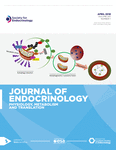Endocrine role of bone: recent and emerging perspectives beyond osteocalcin
- Correspondence should be addressed to K J Oldknow; Email: Karla.Oldknow{at}roslin.ed.ac.uk
Abstract
Recent developments in endocrinology, made possible by the combination of mouse genetics, integrative physiology and clinical observations have resulted in rapid and unanticipated advances in the field of skeletal biology. Indeed, the skeleton, classically viewed as a structural scaffold necessary for mobility, and regulator of calcium–phosphorus homoeostasis and maintenance of the haematopoietic niche has now been identified as an important regulator of male fertility and whole-body glucose metabolism, in addition to the classical insulin target tissues. These seminal findings confirm bone to be a true endocrine organ. This review is intended to detail the key events commencing from the elucidation of osteocalcin (OC) in bone metabolism to identification of new and emerging candidates that may regulate energy metabolism independently of OC.
- Received in final form 15 January 2015
- Accepted 4 February 2015
- Made available online as an Accepted Preprint 5 February 2015
- © 2015 Society for Endocrinology











